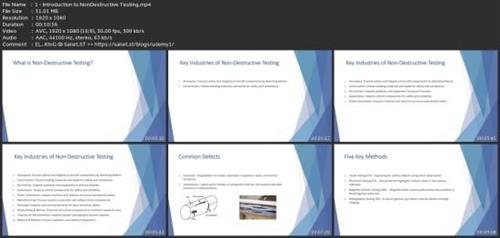Basic Non-Destructive Testing (Ndt)
Basic Non-Destructive Testing (Ndt)
![Basic Non-Destructive Testing (Ndt)]()
What you'll learn
Understand the principles and techniques of NDT.
Learn the applications with the five key NDT methods.
Ensure familiarity with safety standards and practices in NDT.
Understand the practical applications and limitations of each method.
Requirements
Basic Understanding of Engineering Principles: A foundation in physics and mechanics is helpful.
Analytical Thinking: Critical for interpreting test results and making informed decisions.
No Prior Experience Required: This course is designed for beginners, especially fresh engineering graduates.
Attention to Detail: Ability to focus on precise measurements and small defects.
Description
This Basic Non-Destructive Testing (NDT) course offers a comprehensive introduction to the fundamental techniques used to inspect and evaluate materials and components without causing any physical damage. The course thoroughly covers the key principles, methods, and diverse applications of widely recognized NDT techniques, such as visual inspection, ultrasonic testing, radiographic testing, magnetic particle testing, and dye penetrant testing. These methods are critical in ensuring the safety, reliability, and integrity of various materials used in industrial operations across numerous sectors.Designed for individuals who are new to the field as well as professionals aiming to expand their existing knowledge base, the course enables participants to gain valuable skills in assessing the condition, integrity, and safety of materials and components in several critical industries, including oil and gas, aerospace, manufacturing, and construction.Upon successful completion, participants will possess a well-rounded understanding of essential NDT processes and develop the ability to confidently apply these techniques to practical, real-world inspection tasks, ensuring they meet industry standards and requirements for material safety and quality assurance.Moreover, the participants will also learn about the latest technological advancements in NDT methods and how they can be applied to improve inspection efficiency and accuracy, enhancing overall operational effectiveness.
Overview
Section 1: Introduction
Lecture 1 Introduction to Non-Destructive Testing
Section 2: Visual Testing Method (VT)
Lecture 2 Lecture Two Visual Testing (VT)
Section 3: Penetrant Testing Method (PT)
Lecture 3 Penetrant Testing (PT)
Section 4: Magnetic Particle Testing Method (MPT)
Lecture 4 Magnetic Particle Testing (MPT)
Section 5: Radiographic Testing Method (RT)
Lecture 5 Radiographic Testing (RT)
Section 6: Ultrasonic Testing Method (UT)
Lecture 6 Ultrasonic Testing (UT)
Fresh Engineering Graduates in mechanical, civil, or electrical fields.,Professionals Transitioning to NDT from related industries like quality assurance or manufacturing.,Technicians and Inspectors seeking certification in NDT.,Beginners interested in industrial testing, with no prior experience required.
![Basic Non-Destructive Testing (Ndt)]()
Say "Thank You"
rapidgator.net:
ddownload.com:

Published 10/2024
MP4 | Video: h264, 1920x1080 | Audio: AAC, 44.1 KHz
Language: English | Size: 316.85 MB | Duration: 1h 30m
Fundamentals of Non-Destructive Testing Methods in Industrial Applications
MP4 | Video: h264, 1920x1080 | Audio: AAC, 44.1 KHz
Language: English | Size: 316.85 MB | Duration: 1h 30m
Fundamentals of Non-Destructive Testing Methods in Industrial Applications
What you'll learn
Understand the principles and techniques of NDT.
Learn the applications with the five key NDT methods.
Ensure familiarity with safety standards and practices in NDT.
Understand the practical applications and limitations of each method.
Requirements
Basic Understanding of Engineering Principles: A foundation in physics and mechanics is helpful.
Analytical Thinking: Critical for interpreting test results and making informed decisions.
No Prior Experience Required: This course is designed for beginners, especially fresh engineering graduates.
Attention to Detail: Ability to focus on precise measurements and small defects.
Description
This Basic Non-Destructive Testing (NDT) course offers a comprehensive introduction to the fundamental techniques used to inspect and evaluate materials and components without causing any physical damage. The course thoroughly covers the key principles, methods, and diverse applications of widely recognized NDT techniques, such as visual inspection, ultrasonic testing, radiographic testing, magnetic particle testing, and dye penetrant testing. These methods are critical in ensuring the safety, reliability, and integrity of various materials used in industrial operations across numerous sectors.Designed for individuals who are new to the field as well as professionals aiming to expand their existing knowledge base, the course enables participants to gain valuable skills in assessing the condition, integrity, and safety of materials and components in several critical industries, including oil and gas, aerospace, manufacturing, and construction.Upon successful completion, participants will possess a well-rounded understanding of essential NDT processes and develop the ability to confidently apply these techniques to practical, real-world inspection tasks, ensuring they meet industry standards and requirements for material safety and quality assurance.Moreover, the participants will also learn about the latest technological advancements in NDT methods and how they can be applied to improve inspection efficiency and accuracy, enhancing overall operational effectiveness.
Overview
Section 1: Introduction
Lecture 1 Introduction to Non-Destructive Testing
Section 2: Visual Testing Method (VT)
Lecture 2 Lecture Two Visual Testing (VT)
Section 3: Penetrant Testing Method (PT)
Lecture 3 Penetrant Testing (PT)
Section 4: Magnetic Particle Testing Method (MPT)
Lecture 4 Magnetic Particle Testing (MPT)
Section 5: Radiographic Testing Method (RT)
Lecture 5 Radiographic Testing (RT)
Section 6: Ultrasonic Testing Method (UT)
Lecture 6 Ultrasonic Testing (UT)
Fresh Engineering Graduates in mechanical, civil, or electrical fields.,Professionals Transitioning to NDT from related industries like quality assurance or manufacturing.,Technicians and Inspectors seeking certification in NDT.,Beginners interested in industrial testing, with no prior experience required.
Screenshots

Say "Thank You"
rapidgator.net:
ddownload.com: